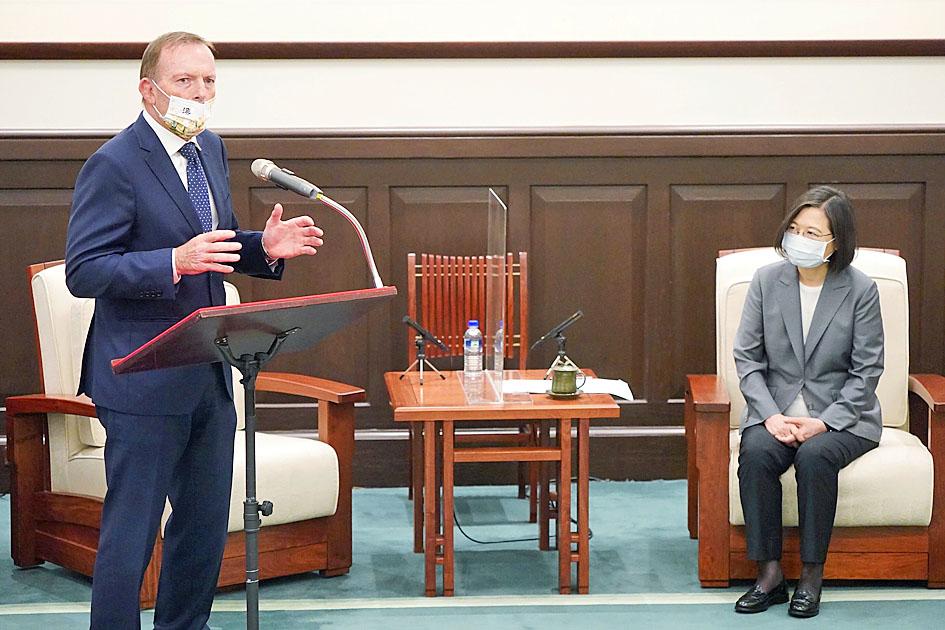Former Australian prime minister Tony Abbott yesterday called on other democracies to stand with Taiwan in its bid to join the Comprehensive and Progressive Agreement for Trans-Pacific Partnership (CPTPP).
Taiwan is a model for the wider world, as it has transformed from a poor nation with autocratic leadership into a vibrant, pluralist democracy, Abbott said during a meeting with President Tsai Ing-wen (蔡英文) at the Presidential Office in Taipei.
Abbott praised Taiwan’s success at controlling the COVID-19 pandemic, despite its absence from global bodies such as the WHO, due to Chinese obstruction.

Photo: Reuters
“It is in large measure to try to help to end this isolation from which Taiwan has been suffering for so many decades that I am here in this country, and I do hope that this will be the first of many visits,” he said.
“You have demonstrated to all the countries of the Indo-Pacific region that it is possible to be both rich and free, to have both liberty and democracy,” said the former Australian leader, who arrived in Taiwan earlier this week to attend a regional forum.
Unfortunately, not everyone is pleased with Taiwan’s progress, and it is challenged on an almost daily basis by its large neighbor, he said.
“It’s more important than ever, under such circumstances, your fellow democracies stand shoulder to shoulder with you,” said Abbott, who served as Australia’s prime minister from 2013 to 2015.
Countries like Australia can best help by building a deeper relationship with Taiwan across the board, particularly in the area of trade, Abbott said.
“I can’t think of a stronger signal of democracies standing shoulder to shoulder with Taiwan than Taiwan’s accession to the CPTPP,” Abbott said.
He expressed the hope that the members of the regional trade bloc would welcome Taiwan’s CPTPP application, which was formally submitted on Sept. 22.
Thanking Abbott for his vocal support of Taiwan’s CPTPP bid, Tsai said Taiwan is pursuing deeper cooperation with other democracies.
“Taiwan is willing to contribute to upholding regional peace and stability,” Tsai said. “We seek to deepen collaboration with other freedom-loving democracies in such areas as vaccines, emerging technologies, climate change and supply chains.”
On Sept. 30, Abbott said during an Australian parliamentary committee hearing that he was “strongly in favor” of Taiwan’s inclusion in the CPTPP, a trade bloc that comprises Australia, Brunei, Canada, Chile, Japan, Malaysia, Mexico, New Zealand, Peru, Singapore and Vietnam.
The Ministry of Foreign Affairs said that Abbott is in Taiwan to deliver a keynote address at the annual Yushan Forum, which is to be held today.
Now in its fifth year, the Taiwan-initiated regional forum seeks to strengthen the nation’s relationship with ASEAN, India, Australia and New Zealand.
Last year, former Australian prime minister Malcolm Turnbull spoke at the forum.
Australian Prime Minister Scott Morrison said that Abbott is in Taiwan as a private citizen.
“I didn’t have any conversation with him before that. Tony has served as my envoy to India. We went to India. We spoke, but Tony is there as a private citizen. So what he’s said and what messages he passed, he passed on in that capacity,” he said.
Additional reporting by Reuters

Taiwan has received more than US$70 million in royalties as of the end of last year from developing the F-16V jet as countries worldwide purchase or upgrade to this popular model, government and military officials said on Saturday. Taiwan funded the development of the F-16V jet and ended up the sole investor as other countries withdrew from the program. Now the F-16V is increasingly popular and countries must pay Taiwan a percentage in royalties when they purchase new F-16V aircraft or upgrade older F-16 models. The next five years are expected to be the peak for these royalties, with Taiwan potentially earning

STAY IN YOUR LANE: As the US and Israel attack Iran, the ministry has warned China not to overstep by including Taiwanese citizens in its evacuation orders The Ministry of Foreign Affairs (MOFA) yesterday rebuked a statement by China’s embassy in Israel that it would evacuate Taiwanese holders of Chinese travel documents from Israel amid the latter’s escalating conflict with Iran. Tensions have risen across the Middle East in the wake of US and Israeli airstrikes on Iran beginning Saturday. China subsequently issued an evacuation notice for its citizens. In a news release, the Chinese embassy in Israel said holders of “Taiwan compatriot permits (台胞證)” issued to Taiwanese nationals by Chinese authorities for travel to China — could register for evacuation to Egypt. In Taipei, the ministry yesterday said Taiwan

Taiwan is awaiting official notification from the US regarding the status of the Agreement on Reciprocal Trade (ART) after the US Supreme Court ruled US President Donald Trump's global tariffs unconstitutional. Speaking to reporters before a legislative hearing today, Premier Cho Jung-tai (卓榮泰) said that Taiwan's negotiation team remains focused on ensuring that the bilateral trade deal remains intact despite the legal challenge to Trump's tariff policy. "The US has pledged to notify its trade partners once the subsequent administrative and legal processes are finalized, and that certainly includes Taiwan," Cho said when asked about opposition parties’ doubts that the ART was

If China chose to invade Taiwan tomorrow, it would only have to sever three undersea fiber-optic cable clusters to cause a data blackout, Jason Hsu (許毓仁), a senior fellow at the Hudson Institute and former Chinese Nationalist Party (KMT) legislator, told a US security panel yesterday. In a Taiwan contingency, cable disruption would be one of the earliest preinvasion actions and the signal that escalation had begun, he said, adding that Taiwan’s current cable repair capabilities are insufficient. The US-China Economic and Security Review Commission (USCC) yesterday held a hearing on US-China Competition Under the Sea, with Hsu speaking on